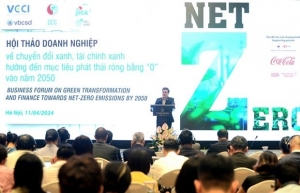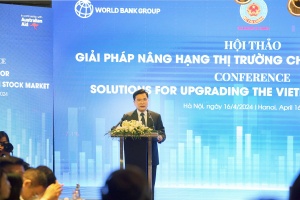Solutions for enhancing provision of the stock market
From SSI’s perspective, what is Vietnam’s short-term story in aiming for a stock market upgrade?
 |
| Nguyen Khac Hai, managing director of Legal and Compliance at SSI Securities Corporation |
In the short run, Vietnam needs to address the remaining two out of nine conditions required for a securities market upgrade. The first condition is non-margin trading, and the second is handling fail trades.
Essentially, these two conditions are interconnected. Currently, the State Securities Commission of Vietnam is actively proposing solutions to implement non-margin trading. To address this issue, Vietnam must ensure that all investors are not required to deposit margin when trading at T0.
We have proposed a solution to assess each investor’s capacity. Based on this assessment, SSI will provide trading limits for foreign investors without margin requirements.
What is the pre-prepared solution to handle late or incomplete settlements through assessing foreign investors’ capacity and providing trading limits?
Firstly, the solution needs to look at the capital capacity of securities companies. For solutions that do not require margins, securities companies must take responsibility first, followed by the Vietnam Securities Depository.
Currently, with anticipated trading upon FTSE Russel’s agreement to upgrade Vietnam’s securities market to an emerging market, Vietnam will immediately receive $1.6 billion from passive exchange-traded funds, and Vietnam will experience 4-5 times more capital inflows from active investment funds. Hence, the capital capacity of securities companies is crucial.
Secondly, securities companies need a robust risk management system to accurately assess the capacity of foreign investors and determine trading limits.
How ready are reputable and financially capable institutional investors to settle, and what causes their concerns beyond non-settlement?
For foreign institutional investors engaging in the Vietnamese securities market, they are invariably major investors since small investors have not devoted time to researching the Vietnamese market. When large foreign institutional investors enter the market to trade, their primary apprehension pertains to credibility-related risks.
Despite significant investments, a single failure accompanied by warnings, such as securities companies disclosing information on investor regulation violations, prompts fears of legal issues due to the complexities involved in addressing them.
Fundamentally, 99 per cent of investors wish to avoid this scenario and will allocate funds for settlement. The remainder is due to objective factors such as time zone differences in Europe, North America, or forex trading issues leading to delayed transfers for foreign investors.
The most crucial aspect when foreign investors fail to settle is to afford them a specified period, such as until T+3, for negotiations. For instance, at T+2 upon securities return, an immediate sale is not necessary for resolution. I suggest an additional day for negotiation.
If by T+3, the investor demonstrates readiness for settlement, SSI is prepared to extend another day. However, if by T+3, the investor shows no willingness or ability to settle, selling at that time is still feasible.
What are the short- and long-term solutions to enhance securities companies’ capacity in providing services to foreign investors?
From the perspective of member securities companies, both short- and long-term solutions exert pressure on capital or require system upgrades, since the responsibility and risks from securities companies are substantial.
Firstly, securities companies need to augment capital resources. In the Central Clearing Counterparty model or Non-prefunding Solution (NPS) service, responsibility for transaction settlement for investors lies with securities companies, necessitating significant capital preparation to limit settlement risks. In Vietnam, we observe that most securities companies plan to increase capital in 2024 and 2025, as a preparatory step for this significant undertaking.
Secondly, securities companies must upgrade their risk management systems to limit settlement and operational risks, especially when implementing solutions like NPS or considering day trading or short sell products in the long term.
Thirdly, we must synchronously develop operational systems and provide service products to foreign investors. A significant hurdle for foreign investors is the English-language information accessibility level of listed companies to international standards.
Finally, securities companies must upgrade their systems to facilitate online connections with foreign investors to enhance order execution capabilities. At the conference on deploying tasks for developing the securities market in 2024, a World Bank representative estimated that Vietnam could attract about $25 billion in foreign capital in the short term.
 | Business forum talks green transition towards net-zero emissions by 2050 A business forum on green transition and finance towards net-zero emissions by 2050 was held in Hanoi on April 11, bringing together hundreds of representatives from ministries, agencies, organisations and businesses. |
 | Vietnam’s road to emerging market status The Ministry of Finance (MoF) started asking for feedback at the end of March on a draft circular aimed at upgrading Vietnam's stock market to 'emerging' status. |
What the stars mean:
★ Poor ★ ★ Promising ★★★ Good ★★★★ Very good ★★★★★ Exceptional
Related Contents
Latest News
More News
- Cashless payments hit 28 times GDP in 2025 (February 04, 2026 | 18:09)
- SSIAM and DBJ launch Japan Vietnam Capital Fund (February 04, 2026 | 15:57)
- Banks target stronger profits, credit growth in 2026 (February 04, 2026 | 15:43)
- Vietnam on path to investment-grade rating (February 03, 2026 | 13:07)
- Consumer finance sector posts sharp profit growth (February 03, 2026 | 13:05)
- Insurance market building the next chapter of protection (February 02, 2026 | 11:16)
- NAB Innovation Centre underscores Vietnam’s appeal for tech investment (January 30, 2026 | 11:16)
- Vietnam strengthens public debt management with World Bank and IMF (January 30, 2026 | 11:00)
- Corporate bond market poised for stronger growth cycle (January 28, 2026 | 17:13)
- Vietnam's IPO market on recovery trajectory (January 28, 2026 | 17:04)

 Tag:
Tag:


















 Mobile Version
Mobile Version